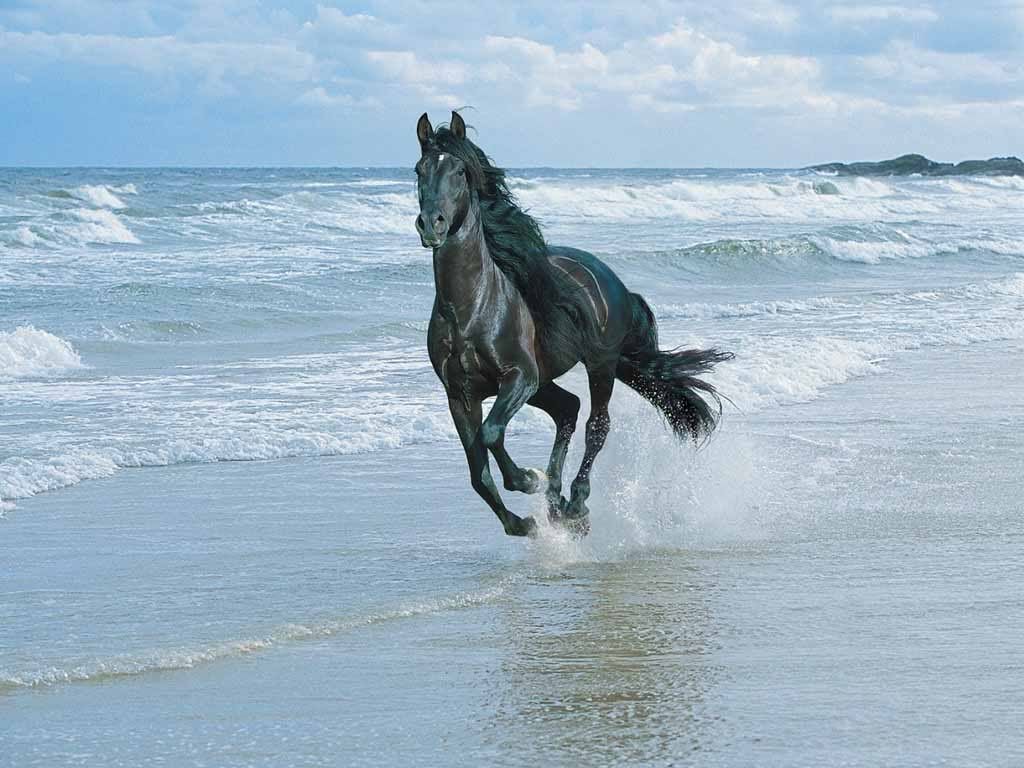 Much as I tend to dislike horses (or maybe it's because I'm afraid of them), I find they are very much in my life - my Chinese zodiac sign is The Horse, my now-defunct booking agency was called Horse of a Different Color Booking and a variety of other examples as well. For whatever reason, we seem to be inextricably linked - I wonder if I have some sort of past life connection with equines.
Much as I tend to dislike horses (or maybe it's because I'm afraid of them), I find they are very much in my life - my Chinese zodiac sign is The Horse, my now-defunct booking agency was called Horse of a Different Color Booking and a variety of other examples as well. For whatever reason, we seem to be inextricably linked - I wonder if I have some sort of past life connection with equines.
MH and I started a mutually-supportive self-nurturing program last week, and we've walked 7 days out of the last 10 (as well as begun to eat more healthy and mindfully) - I've said that I look forward to it now, like a thoroughbred out of the starting gate... and this poem and song illustrate my renewed life enjoyment...
SONG: Run the Wild Country by Louise Taylor
BOOK: Riding into Your Mythic Life: Transformational Adventures with the Horse by Patricia Broersma, Jean Houston (Foreword)
POEM: The Great Affair by Diane Ackerman
The great affair, the love affair with life,
is to live as variously as possible,
to groom one's curiosity like a high-spirited thoroughbred,
climb aboard, and gallop over the thick, sun-struck hills every day.
Where there is no risk, the emotional terrain is flat and unyielding,
and, despite all its dimensions, valleys, pinnacles, and detours,
life will seem to have none of its magnificent geography, only a length.
It began in mystery, and it will end in mystery,
but what a savage and beautiful country lies in between.
QUOTE: "A horse is the projection of peoples' dreams about themselves - strong, powerful, beautiful - and it has the capability of giving us escape from our mundane existence." ~ Pam Brown
Monday, March 31, 2008
Run the Wild Country (Louise Taylor)
Posted by
Susan
at
5:25 PM
1 comments
![]()
Labels: Diane Ackerman, horse, Jean Houston, Louise Taylor, Pam Brown, Patricia Broersma
Saturday, March 29, 2008
Get Together (The Youngbloods)
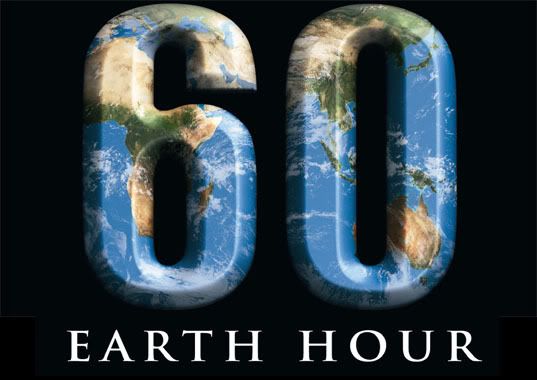 I pulled up the Google website this morning and, for a moment, worried there was something wrong with my computer - the screen was black, but for a few words. Upon further inspection, I read... and then grinned - the text:
I pulled up the Google website this morning and, for a moment, worried there was something wrong with my computer - the screen was black, but for a few words. Upon further inspection, I read... and then grinned - the text:
We've turned the lights out. Now it's your turn - Earth Hour.
I've been planning for weeks to participate, and it was a lovely (and creative) reminder - my friend MH is coming over about 7-ish for our almost-daily walk (more on that another time) and I figure that, by the time we finish, it should be the "lights-out" hour, at which point we can get in the jacuzzi and appreciate the darkness. Let's see who else in my neighborhood participates - this should be looked upon, not as a sacrifice, but as a genuine effort to show we can focus, gather and make a difference, locally *and* globally...
A global event created to symbolize that each one of us, working together, can make a positive impact on climate change
Earth Hour is a global event created to symbolize that each one of us, working together, can make a positive impact on climate change - no matter who we are or where we live.
Created by WWF in Sydney, Australia in 2007, Earth Hour has grown from a single event into a global movement. In 2008, millions of people, businesses, governments and civic organizations in nearly 200 cities around the globe will turn out for Earth Hour. More than 35 US cities will participate, including the US flagships--Atlanta, Chicago, Phoenix and San Francisco.
Earth Hour brings together communities, local governments, corporate and nongovernmental organizations to heighten awareness about climate change and to inspire our nation to take practical actions to reduce their own carbon footprints.
Earth Hour: March 29, 2008 8 - 9 PM
- Cities around the world will join together in literally turning off the lights for one hour to offer leadership and symbolize their commitment to finding climate change solutions.
- Lights will be turned off at iconic buildings and national landmarks from 8 p.m. to 9 p.m.
- Local businesses and restaurants will also be asked to turn off their lights.
- People at home can take advantage of the hour by replacing their standard light bulbs with energy-efficient compact fluorescent bulbs.
"This is the perfect opportunity for individuals, governments, businesses and communities around the world to unite for a common purpose, in response to a global issue that affect us all." - Carter S. Roberts, President and CEO WWF
Showcase your commitment to finding climate change solutions by making a personal pledge to reduce your own carbon footprint at www.earthhour.org
SONG: Get Together by The Youngbloods
BOOK: The Lorax by Dr. Seuss
POEM: Unison Benediction by May Sarton
Return to the most human,
nothing less will nourish the torn spirit,
the bewildered heart,
the angry mind:
and from the ultimate duress,
pierced with the breath of anguish,
speak of love.
Return, return to the deep sources,
nothing less will teach the stiff hands a new way to serve,
to carve into our lives the forms of tenderness
and still that ancient necessary pain preserve.
Return to the most human,
nothing less will teach the angry spirit,
the bewildered heart;
the torn mind,
to accept the whole of its duress,
and pierced with anguish.
at last, act for love.
QUOTE(S): "The struggle to save the global environment is in one way much more difficult than the struggle to vanquish Hitler, for this time the war is with ourselves. We are the enemy, just as we have only ourselves as allies." ~ Al Gore
Posted by
Susan
at
2:20 PM
1 comments
![]()
Labels: Al Gore, Brooke Medicine Eagle, Dr. Seuss, Earth Hour, May Sarton, Youngbloods
Friday, March 28, 2008
Cold Dog Soup (Guy Clark)
 Thanks to my friend sharon, who posted a heads-up to the Mary Chapin Carpenter list regarding the first national Poem in Your Pocket Day - I use Poets.org quite often as a resource for my blog, as well as The Writer's Almanac and Panhala.
Thanks to my friend sharon, who posted a heads-up to the Mary Chapin Carpenter list regarding the first national Poem in Your Pocket Day - I use Poets.org quite often as a resource for my blog, as well as The Writer's Almanac and Panhala.
~ Urge local businesses to offer discounts for those carrying poems
~ Post pocket-sized verses in public places
~ Handwrite some lines on the back of your business cards
~ Start a street team to pass out poems in your community
~ Distribute bookmarks with your favorite immortal lines
~ Add a poem to your email footer
~ Post a poem on your blog or social networking page
~ Project a poem on a wall, inside or out
~ Text a poem to friends
Poem In Your Pocket Day has been celebrated each April in New York City since 2002. Each year, city parks, bookstores, workplaces, and other venues burst with open readings of poems from pockets. Even the Mayor gets in on the festivities, reading a poem on the radio. For more information on New York City’s celebration, visit nyc.gov/poem.
POEM: How To Eat a Poem by Eve Merriam
may run down your chin.
You do not need a knife or fork or spoon
"Poetry ennobles the heart and the eyes, and unveils the meaning of all things upon which the heart and the eyes dwell. It discovers the secret rays of the universe, and restores to us forgotten paradises." ~ Edith Sitwell
Posted by
Susan
at
11:55 PM
0
comments
![]()
Labels: Edgar Allen Poe, Eve Merriam, Guy Clark, Karen Barbour, Lee Bennett Hopkins, poetry
Thursday, March 27, 2008
Be Here Now (Willy Porter)
 My devotion to Christine Kane's songs and blog posts have been detailed here before - her wisdom comes in many ways, shapes and sizes and almost everything she writes hits me in the heart at one time or another.
My devotion to Christine Kane's songs and blog posts have been detailed here before - her wisdom comes in many ways, shapes and sizes and almost everything she writes hits me in the heart at one time or another.
Posted by
Susan
at
3:05 PM
0
comments
![]()
Labels: Annie Dillard, Christine Kane, Eckhart Tolle, Gary Johnson, now, Release, Willy Porter
Wednesday, March 26, 2008
D. B. Cooper (Todd Snider)
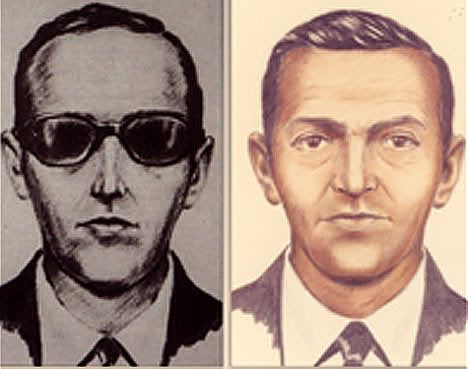 This news story came across the AP wires this morning... at about the same time this poem's e-newsletter arrived in my inbox - somehow, in my metempsychotic (I learned a new word today!) brain, they seemed to fit... :-)
This news story came across the AP wires this morning... at about the same time this poem's e-newsletter arrived in my inbox - somehow, in my metempsychotic (I learned a new word today!) brain, they seemed to fit... :-)
Investigators Analyzing Parachute for Link to Suspect D.B. Cooper
by PIERRE THOMAS, JACK DATE and THERESA COOK
It's dirty and it's old, but a piece of cloth found in a Washington field might hold the key to solving one of the FBI's most enduring mysteries.
On Nov. 24, 1971, an unassuming man wearing a business suit and appearing to be in his mid-40s allegedly hijacked and threatened to blow up a Northwest Orient Airlines plane traveling from Portland, Ore., to Seattle if he did not get four parachutes and a $200,000 ransom.
"Back in the early '70's, late '60's, hijackings weren't uncommon. The philosophy of the day was cooperate. Comply with his demands and we'll deal with it when the plane lands," said Larry Carr, an FBI special agent who manages the case out of the bureau's office in Seattle.
But no Cooper.
He noted that parachutes buried in the middle of nowhere aren't something found very often, so the find could offer a big break in the case if it pans out.
BOOK(S): D. B. Cooper - Portrait of an American Hijacker by Biographiq (2008)
QUOTE(S): History, like a vast river, propels logs, vegetation, rafts, and debris; it is full of live and dead things, some destined for resurrection; it mingles many waters and holds in solution invisible substances stolen from distant soils." ~ Jacques Barzun
Posted by
Susan
at
2:10 PM
0
comments
![]()
Labels: Biographiq, D.B. Cooper, history, Jacques Barzun, Jane Hirshfield, Ralph P. Himmelsbach, Todd Snider, Will Durant
Monday, March 24, 2008
Mary Catherine's Ash Wednesday Journal Entry (Christine Kane)
 Hey, peeps (sorry!) - now for the lighter side of Easter (this picture just begged for accompanying text... :-)
Hey, peeps (sorry!) - now for the lighter side of Easter (this picture just begged for accompanying text... :-)
Just in Time for Easter (and Beyond): The Famous Marshmallow Peeps
By Hally Z., published Apr 04, 2007
Has anyone not heard of those little marshmallow candies called Peeps? Well, the squishy Marshmallow Peep has a history spanning over 50 years. Back in 1953, when the chocolate-making Just Born Company bought the jelly bean-making Rodda Candy Company, Rodda also produced a marshmallow candy that was squeezed out by hand from a pastry tube, then colored yellow, decorated, and made to look like a newborn chick. Rodda had been producing these chicks since the 1920's. From start to finish, the "pre-Peep" manufacturing process took a total of 27 hours. Just Born, intrigued by Rodda's marshmallow chick, brought in special machinery to speed up production. Nowadays it takes only six minutes to create a Marshmallow Peep, with two million produced each day.
The Marshmallow Peeps chicks stood alone as an Easter treat item until the late 50's, when Just Born decided to start making seasonal Peeps for other holidays. Pumpkin and cat Peeps were produced for Halloween, and evergreen trees and snowmen were produced for Christmas/winter.
SONG: Mary Catherine's Ash Wednesday Journal Entry by Christine Kane
BOOK: Peeps: A Candy-Coated Tale by Mark Masyga, Martin Ohlin
QUOTE: "I prefer to regard a dessert as I would imagine the perfect woman: subtle, a little bittersweet, not blowsy and extrovert. Delicately made up, not highly rouged. Holding back, not exposing everything and, of course, with a flavor that lasts." ~ Graham Kerr
Posted by
Susan
at
3:15 PM
0
comments
![]()
Labels: candy, Christine Kane, Easter, Graham Kerr, Mark Masyga, Martin Ohlin, peeps
Sunday, March 23, 2008
Stained Glass (Danny Schmidt)
 Today is Easter Sunday - being a "recovering-Catholic"-turned-UU, I haven't celebrated the holiday in the religious sense in quite a while, but I do appreciate the spiritual tradition of rebirth/renewal/
Today is Easter Sunday - being a "recovering-Catholic"-turned-UU, I haven't celebrated the holiday in the religious sense in quite a while, but I do appreciate the spiritual tradition of rebirth/renewal/
reawakening (see Thursday's post) as well as the opportunity for loved ones to gather.
We've always had family rituals and those are still in place, albeit tweaked - I used to put out baskets for the kids, filled with candy and a book, stuffed animal or toy. As they got older, the chocolate remained and the treat morphed into a CD or DVD - now that they're "grown", I give each the Ferrero Rocher box in the shape of a bunny and a card with $20!
I'm cooking mahi-mahi with mango-peach salsa, wild rice, green bean casserole, squash casserole and croissants and will provide red and white wine - Sarah will bring dessert... and we'll eat on the patio about 2 p.m.-ish (since Rob has to work at 4). It's a shame Eric wasn't able to make it home again so soon after Spring Break, and we'll miss him - I'll boil a dozen and a half eggs, we'll color them sometime during the day and write his name on one... :-)
Please make a point to read the lyrics of today's song - when I first heard Danny's music three years ago, its brilliance was unmistakeable, and drew me in to discover more...
Happy Easter... however you celebrate, whatever your beliefs...
SONG: Stained Glass by Danny Schmidt
BOOK: Easter Everywhere: A Memoir by Darcey Steinke
POEM: The Discipline of Craft, Easter Morning by Judith Harris
No use going hunting for angels,
for a Christ in the tree-mops,
a Moses winding his way up the mount
into the fire of God’s fresh stubble.
There is just a serious rain,
a steady crutch for the air,
colder than any April should be.
I am up to my neck in chores:
the cat needs more food,
my daughter’s clutter piles up like ant hills,
I fold her little sleeves, ghost by ghost.
What melody springs from the heart so well?
These lone trees can’t be dazzled by sun today,
they have such tremors like the Pope’s.
Lost loons pitched into sky folds,
their crusty buds just blinking
as if to test how fierce the light is.
They sag and meander from their stems,
they bleed from transparency.
Needless or hopeless, as overused fountains,
they are my metrics, my fortitude;
plants with lemony grass spigots
that will never go dry.
QUOTE: "Easter is not a time for groping through dusty, musty tomes or tombs to disprove spontaneous generation or even to prove life eternal. It is a day to fan the ashes of dead hope, a day to banish doubts and seek the slopes where the sun is rising, to revel in the faith which transports us out of ourselves and the dead past into the vast and inviting unknown." ~ Author unknown, as quoted in the Lewiston Tribune
Posted by
Susan
at
11:00 AM
0
comments
![]()
Labels: Danny Schmidt, Darcey Steinke, Easter, Judith Harris
Saturday, March 22, 2008
Girl with a Hay Rake (Jack Harris)
 From Today's Writer's Almanac:
From Today's Writer's Almanac:
Today is the birthday of poet Billy Collins, (books by this author) born in New York in 1941. Collins is both a critically acclaimed and popular poet, a unique combination in the world of modern poetry. Collins began writing poems at age 12. He devoured all the poetry he read, especially the contemporary poems in Poetry magazine. In an interview, Collins explained, "I remember reading a poem by Thom Gunn about Elvis Presley, and that was a real mindblower because I didn't know you could write poems about Elvis Presley. I thought there was poetry — what you read in class — and then when you left class there was Elvis. I didn't see them together until I read that poem."
Collins began selling his poems to Rolling Stone for $35 a pop in the 1970s. He married Diane Olbright in 1977 and published his first book of poems, Pokerface, that year, but it wasn't until the publication of Questions About Angels in 1991 that he began drawing critical attention. His other major poetry collections are The Apple that Astonished Paris (1988), The Art of Drowning (1995), Picnic, Lightning (1998), Sailing Alone Around the Room: New and Selected Poems (2001), Nine Horses: Poems (2002), and The Trouble with Poetry and Other Poems (2005). Collins' style is light, humorous, and fond of extended metaphor. He uses mundane situations as diving boards into the larger philosophical questions of life. His poem "Forgetfulness" starts this way:
The name of the author is the first to go
followed obediently by the title, the plot,
the heartbreaking conclusion, the entire novel
which suddenly becomes one you have never read,
never even heard of,
as if, one by one, the memories you used to harbor
decided to retire to the southern hemisphere of the brain,
to a little fishing village where there are no phones.
Collins said, "Usually I try to create a hospitable tone at the beginning of a poem. Stepping from the title to the first lines is like stepping into a canoe. A lot of things can go wrong."
A friend introduced me to the wondrous words of Billy Collins quite a few years back - I seem to have misplaced the friend... but I found the poet... and both remain cherished...
Today's theme? - paintings described in songs, poems and prose.. :-)
SONG: Girl with a Hay Rake by Jack HarrisBOOK: Art: The World's Greatest Paintings Explored and Explained by Robert Cumming
POEM: Fishing On The Susquehanna In July by Billy Collins
I have never been fishing on the Susquehanna
or on any river for that matter
to be perfectly honest.
Not in July or any month
have I had the pleasure — if it is a pleasure —
of fishing on the Susquehanna.
I am more likely to be found
in a quiet room like this one —
a painting of a woman on the wall,
a bowl of tangerines on the table —
trying to manufacture the sensation
of fishing on the Susquehanna.
There is little doubt
that others have been fishing
on the Susquehanna,
rowing upstream in a wooden boat,
sliding the oars under the water
then raising them to drip in the light.
But the nearest I have ever come to
fishing on the Susquehanna
was one afternoon in a museum in Philadelphia,
when I balanced a little egg of time
in front of a painting
in which that river curled around a bend
under a blue cloud-ruffled sky,
dense trees along the banks,
and a fellow with a red bandana
sitting in a small green
flat-bottom boat
holding the thin whip of a pole.
That is something I am unlikely
ever to do, I remember
saying to myself and the person next to me.
Then I blinked and moved on
to other American scenes
of haystacks, water whitening over rocks,
even one of a brown hare
who seemed so wired with alertness
I imagined him springing right out of the frame.
QUOTE: "The aim of every artist is to arrest motion, which is life, by artificial means and hold it fixed so that a hundred years later, when a stranger looks at it, it moves again since it is life." ~ William Faulkner
Posted by
Susan
at
12:10 PM
0
comments
![]()
Labels: art, Billy Collins, Jack Harris, Robert Cumming, William Faulkner, Winslow Homer
Friday, March 21, 2008
One Thousand Candles, One Thousand Cranes (Small Potatoes)
 Wednesday was the the five-year "anniversary" of the Iraq War - a moment of respectful silence, please...
Wednesday was the the five-year "anniversary" of the Iraq War - a moment of respectful silence, please...
Gimundo, 3/12/08
Then I realize it was a dream and I wonder how she is. For a while, I'm lost in my sad thoughts and join my hands in prayer before the tablet of the deceased.
- from a letter by Fujiko Sasaki, Sadako Sasaki's mother
On August 6th, 1945, World War II's Allied forces dropped an atomic bomb on the Japanese city of Hiroshima. In an instant, the city was obliterated. When the dust had cleared, people's shadows remained frozen in place on sidewalks and the sides of buildings. The people themselves simply vanished. On that tragic day, 140,000 civilians were killed.
The Sasaki family lived one mile from the spot where the bomb went off. The couple and their two-year-old daughter, Sadako, managed to survive the nuclear attack, though soon after the explosion, thick black clouds of radioactive soot and dust began to fall like snow. Though the family tried to protect themselves, they could not avoid breathing the contaminated air.
As time went on, the young family tried to rebuild their damaged lives. The war had ended; they could put it behind them. The Sasakis had three more children, though Sadako was always her mother's favorite: "She was so considerate and thoughtful that I relied on her," she wrote. As Sadako grew older, she became a strong, healthy, athletic young woman – she was the fastest runner on her school track team.
But when Sadako was twelve years old, she noticed that her lymph nodes were becoming swollen. A doctor's visit confirmed her parents' greatest fears: Sadako had been contaminated with radiation poisoning from the atomic bomb. She was dying of leukemia.
Soon, Sadako was forced to enter the Hiroshima Red Cross hospital for treatment. She spent months there, her disease progressing day by day. In August 1955, residents of Nagoya sent a gift of colored origami paper cranes to Sadako and the other hospital residents as a get-well present. The gift brightened the sick child's day – and it gave her an idea.
"She believed in a saying that if you fold a thousand cranes, you'd get over your sickness," her mother wrote. "She folded paper cranes carefully, one by one using a piece of paper of advertisement, medicine and wrapping. Her eyes were shining while she was folding the cranes, showing she wanted to survive by all means."
Though she was very weak, Sadako dedicated hours each day to folding cranes out of whatever materials she could scrounge together. "We warned her, ‘If you keep up that pace you'll wear yourself out,'" her father, Shigeo Sasaki, recounted. "Sadako continued to fold, saying, ‘It's okay, it's okay. I have a plan.' "
When she got to one thousand, she kept on going, hopeful that the paper birds might magically cure her illness. But it was not to be: Sadako died on the morning of October 25, 1955, surrounded by her family.
As for Sadako's thousand paper cranes, her mother gave some of them to her school friends, "and put the rest of them in her coffin as well as flowers so that she could bring them to the next world."
Although Sadako's thousand paper cranes could not save her life, they would take flight in another way, serving as a symbol of the growing movement for peace on Earth.
The following year, an Austrian journalist, Robert Jungk, traveled to Hiroshima, where he heard the story of young Sadako and her one thousand cranes. He was so moved by the tale of her determination that he told a modified version of her story to the world in a book, Light in the Ruins. In the years since, variations of Sadako's story have appeared in hundreds of other publications, most notably, a children's book called Sadako and the Thousand Paper Cranes, written in 1977 by American author Eleanor Coerr. The story has been used in peace education programs around the world.
Sadako's short life has also inspired another sort of legacy: the Children's Peace Monument in Hiroshima. After Sadako's death, her classmates sought to honor their friend by creating "a monument to mourn all the children who died from the atomic bombing." With support from more than 3,100 schools around the world, the students created a nine-meter high bronze statue, topped with a figure of a girl holding a folded crane. Beneath the pedestal, there is an inscription: "This is our cry. This is our prayer. For building peace in this world."
Each year, children and adults from all over the world travel to the Children's Peace Monument, bringing their own folded paper cranes as a gift to Sadako's memory, and as a symbol of their desire for peace and for the abolition of nuclear weapons. In hundreds of other cities around the world, from Kuwait City to Santa Barbara, California, children have become involved in projects to create paper cranes as symbols of peace, honoring Sadako's legacy.
Though she could not save her own life with one thousand cranes, her story may yet save millions.
[Added: thanks so much to Judy for her comment below - please go to http://thecraneproject.blogspot.com/ to check out her amazing, inspirational and tangible call for peace... ]
Posted by
Susan
at
1:20 AM
4
comments
![]()
Labels: cranes, J. Ramsay MacDonald, peace, Small Potatoes, Takayuki Ishii, Walt Whitman, war
Thursday, March 20, 2008
Spring (Richard Shindell)
 From Today's Writer's Almanac:
From Today's Writer's Almanac:
Today is the first day of spring, the vernal equinox in the Northern Hemisphere. The Earth is tilted on its axis, so as it travels around the Sun each pole is sometimes tilted towards the Sun and sometimes tilted away. It is this tilt that causes the seasons, as well as the shortening and lengthening of daylight hours. On this day, the north and south poles are equally distant from the sun, so we will have almost exactly the same amount of daytime as nighttime.
I love living in South Florida (we moved here 16 years ago this month) but the seasons are not easily discernible - when we lived in Atlanta, the four quadrants of the annual calendar exhibited visible lines of demarcation: fall's crunchy leaves, winter's frosted lawns, spring's bursting dogwoods and summer's oppressive humidity.
It's basically always warm, green and flowering in my part of the state (not that there's anything wrong with that!) - in fact, I, who have had a black thumb for most of my life, now appreciate being able to make almost any plant flourish under my oftentimes neglectful care. We have a yard full of various hibiscus, bougainvillea, bromeliads, crotons, an assortment of palms, ixora, liriope, thumbergia, and so many others - suffice it to say if it's vegetation, it grows with little or no help. I even have a gardenia bush on the side of the house that blooms for only a month (mid-April to mid-May), although it whacked out this year, started producing blossoms in January and it hasn't stopped yet - what a treat!
Spring is a time of rebirth, renewal and reawakening and I seem to be going through a bit of that myself... trying to find my way back from scramble mode to equilibrium, starting with cutting back my working-outside-the-home hours (soon, I hope) and downsizing my volunteer/committee work - it's continued with reclaiming my home office/guest bedroom (after Sarah's departure) and an ongoing effort to purge/consolidate/streamline. I appear to be breathing more and stressing less - I can already envision more reading for pleasure and walking for health... :-)
I have a calligraphic print on my dining room wall entitled Chaos: Where Great Dreams Begin - the text reads: "Before a great vision can become reality there may be difficulty. Before a person begins a great endeavor, they may encounter chaos. As a new plant breaks the ground with difficulty, foreshadowing the huge tree, so must we sometimes push against difficulty in bringing forth our dreams."
Here's/cheers to embracing change in order to achieve vision - puuuuuuuuuusssssssshhhhhhhhhhh!
SONG: Spring by Richard Shindell
BOOK: Silent Spring by Rachel Carson
POEM: Starting With Little Things by William Stafford
Love the earth like a mole,
fur-near. Nearsighted,
hold close the clods,
their fine-print headlines.
Pat them with soft hands --
Like spades, but pink and loving; they
break rock, nudge giants aside,
affable plow.
Fields are to touch;
each day nuzzle your way.
Tomorrow the world.
QUOTE: In the spring, at the end of the day, you should smell like dirt." ~ Margaret Atwood
Posted by
Susan
at
2:10 PM
2
comments
![]()
Labels: Margaret Atwood, Rachel Carson, Richard Shindell, Spring, William Stafford
Monday, March 17, 2008
You're Not Irish (Robbie O'Connell)
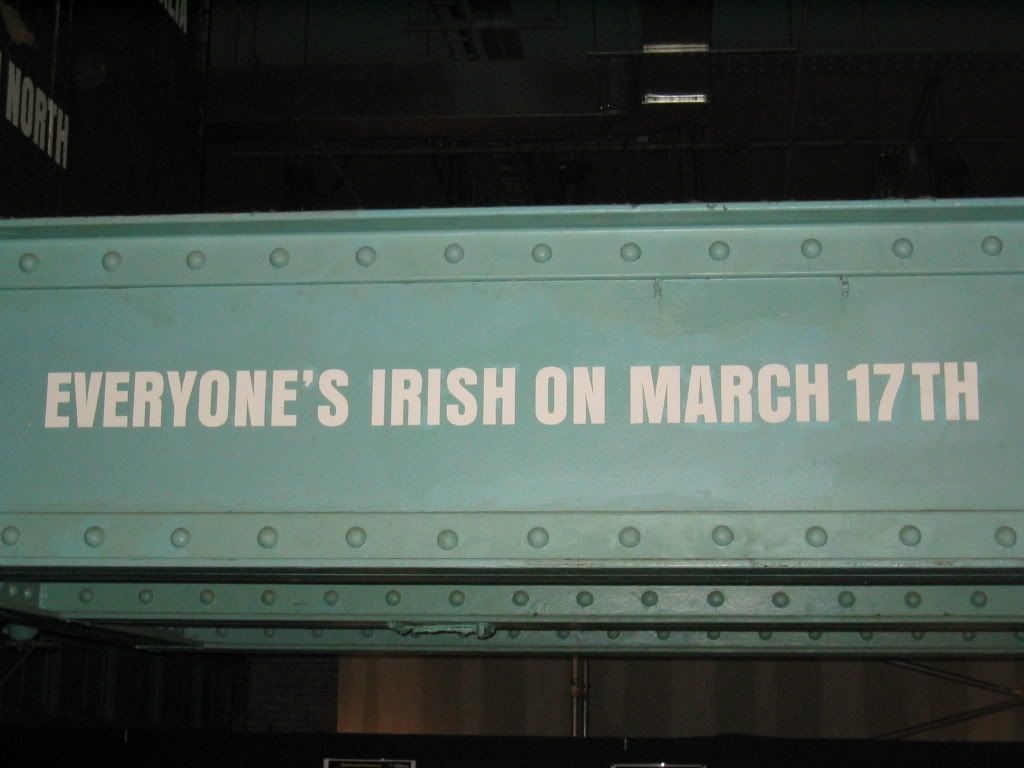 It's been another crazy week - I had every intention of posting something today about the most amazing concert I presented Saturday night, but time/energy does not seem to permit...
It's been another crazy week - I had every intention of posting something today about the most amazing concert I presented Saturday night, but time/energy does not seem to permit...
Tonight is a meeting and Tuesday I'm having out-of-state visiting friends over for dinner - hoping to get caught up soon... :-)
In the meantime, Happy St. Patrick's Day - must remember to wear something green!
NYC pub owner bans `Danny Boy' in March
By Verena Dobnik, Associated Press Writer - Thursday March 6, 2008
NEW YORK - It's depressing, it's not usually sung in Ireland for St. Patrick's Day, and its lyrics were written by an Englishman who never set foot on Irish soil. Those are only some of the reasons why a Manhattan pub owner is banning the song "Danny Boy" for the entire month of March.
"It's overplayed, it's been ranked among the 25 most depressing songs of all time and it's more appropriate for a funeral than for a St. Patrick's Day celebration," said Shaun Clancy, who owns Foley's Pub and Restaurant, across the street from the Empire State Building.
has not altered;--
a place as kind as it is green,
the greenest place I've never seen.
Every name is a tune.
Denunciations do not affect
the culprit; nor blows, but it
is torture to him to not be spoken to.
They're natural,--
the coat, like Venus'
mantle lined with stars,
buttoned close at the neck,-the sleeves new from disuse.
If in Ireland
they play the harp backward at need,
and gather at midday the seed
of the fern, eluding
their "giants all covered with iron," might
there be fern seed for unlearn-
ing obduracy and for reinstating
the enchantment?
Hindered characters
seldom have mothers
in Irish stories, but they all have grandmothers.
a match not a marriage was made
when my great great grandmother'd said
with native genius for
disunion, "Although your suitor be
perfection, one objection
is enough; he is not
Irish." Outwitting
the fairies, befriending the furies,
whoever again
and again says, "I'll never give in," never sees
until you've been made captive by
supreme belief,--credulity
you say? When large dainty
fingers tremblingly divide the wings
of the fly for mid-July
with a needle and wrap it with peacock-tail,
or tie wool and
buzzard's wing, their pride,
like the enchanter's
is in care, not madness. Concurring hands divide
that when bleached by Irish weather
has the silvered chamois-leather
water-tightness of a
skin. Twisted torcs and gold new-moon-shaped
lunulae aren't jewelry
like the purple-coral fuchsia-tree's. Eire--
the guillemot
so neat and the hen
of the heath and the
linnet spinet-sweet-bespeak relentlessness? Then
like enchanted Earl Gerald who
changed himself into a stag, to
a great green-eyed cat of
the mountain. Discommodity makes
them invisible; they've dis-
appeared. The Irish say your trouble is their
trouble and your
joy their joy? I wish
I could believe it;
I am troubled, I'm dissatisfied, I'm Irish.
QUOTE: "If you're enough lucky to be Irish, you're lucky enough!" ~ Irish Saying
Posted by
Susan
at
12:15 AM
0
comments
![]()
Labels: Irish, Margaret Kelleher, Marianne Moore, Robbie O'Connell, St. Patrick's Day
Wednesday, March 12, 2008
If Children Had Wings (Gordon Lightfoot)
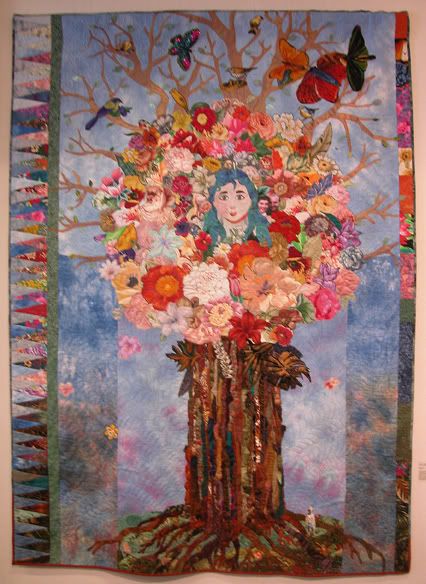 What with Eric home from college this week for Spring Break... and Sarah moved out two weeks ago, we've not yet had a chance to get us all under one roof/around one table as is our modus operandi - that will be rectified this evening, as we're planning a family dinner. We're not yet decided whether we'll go out to a restaurant or stay in with me cooking - I'm on the record as voting for the former... :-)
What with Eric home from college this week for Spring Break... and Sarah moved out two weeks ago, we've not yet had a chance to get us all under one roof/around one table as is our modus operandi - that will be rectified this evening, as we're planning a family dinner. We're not yet decided whether we'll go out to a restaurant or stay in with me cooking - I'm on the record as voting for the former... :-)
POEM: The Way Wings Should by Rumi
QUOTE: "There are two lasting bequests we can give our children. One is roots. The other is wings." ~ Hodding Carter, Jr.
Posted by
Susan
at
2:55 PM
0
comments
![]()
Labels: Barbara Curtis, Gordon Lightfoot, Hodding Carter Jr., roots, Rumi, wings
Tuesday, March 11, 2008
Hard Sun (Gordon Peterson)
I am a big fan of The Lefsetz Letter, an e-newsletter in which Bob Lefsetz rants, raves, reflects and respects music issues on a semi-daily basis - a recent post spoke of the song Hard Sun featured in the soundtrack of Into the Wild, which he incorrectly attributed to Eddie Vedder. So, there was a follow-up blog in which hundreds of people wrote to unveil the writer of the original tune - fascinating stuff...
Shining light on Hard Sun
January 26, 2008
Carli Whitwell
Special to The Hamilton Spectator
When the 2008 Oscar nominations were announced this week, more than a few Eddie Vedder fans were left scratching their heads.
Their idol had given them a great new song on the soundtrack of the Sean Penn-directed movie Into The Wild, which stars Emile Hirsch as restless adventurer Christopher McCandless. The song was called Hard Sun, a spectacular piece of indie rock that exquisitely captured the central character's quest for enlightenment.
But the Academy ignored it.
There was a reason for that. Vedder, the famous Pearl Jam front man who sang the movie version of Hard Sun, didn't write it.
As a matter of fact, the track was composed by a relatively obscure songwriter from Dundas. His name is Gordon Peterson.
And he wrote it some 20 years ago, about a decade before publication of Jon Krakauer's 1997 nonfiction book on which Into The Wild was based.
Originally, Hard Sun was recorded as the first single off the 1989 album Big Harvest. Peterson wrote, sang and played many of the instruments on it, but it was released under the pen name Indio.
It was the only album Peterson made before turning his back on the music business and disappearing into anonymity.
So what happened to him?
The rest of the article can be found here...
Another wonderful article with more info...
SONG: Hard Sun by Gordon Peterson
BOOK: Into the Wild by Jon Krakauer
POEM: Oh Earth Wait for Me by Pablo Neruda
Return me, oh sun,
to my wild destiny,
rain of the ancient wood
bring me back the aroma and the swords
that fall from the sky,
the solitary peace of pasture and rock,
the damp at the river-margins,
the smell of the larch tree,
the wind alive like a heart
beating in the crowded restlessness
of the towering araucaria.
Earth, give me back your pure gifts,
the towers of silence which rose
from the solemnity of their roots.
I want to go back to being what I have not been,
and learn to go back from such deeps
that amongst all natural things
I could live or not live; it does not matter
to be one stone more, the dark stone,
the pure stone which the river bears away.
QUOTE: "The mind I love must have wild places, a tangled orchard where dark damsons drop in the heavy grass, an overgrown little wood, the chance of a snake or two, a pool that nobody's fathomed the depth of, and paths threaded with flowers planted by the mind." ~ Katherine Mansfield
Posted by
Susan
at
11:59 PM
0
comments
![]()
Labels: Bob Lefsetz, Gordon Peterson, Jon Krakauer, Katherine Mansfield, Pablo Neruda, wild
Monday, March 10, 2008
Dimming of the Day (Richard Thompson)
 I wrote the following note to my friend the other night - this explains why I haven't posted in *four* days... and I didn't even cover the amazing Saturday and Sunday house concerts I attended!
I wrote the following note to my friend the other night - this explains why I haven't posted in *four* days... and I didn't even cover the amazing Saturday and Sunday house concerts I attended!
I just left you a voicemail - long story short: yes, I'd love to carpool! (want to come here about 7 p.m.?).
Long story long: I've had a wacky week (I can hear you asking, what else is new?) - no, really... more so than usual....
BOOK: Each Day a New Beginning: Daily Meditations For Women by Karen Casey
QUOTE: "Who forces time is pushed back by time; who yields to time finds time on his side." ~ The Talmud
Posted by
Susan
at
9:50 PM
0
comments
![]()
Labels: John O'Donohue, Karen Casey, Richard Thompson, Talmud, time
Wednesday, March 5, 2008
The World's Not Falling Apart (Dar Williams)
 Okay, how much do we love Dar Williams?!? - rhetorical question... :-)
Okay, how much do we love Dar Williams?!? - rhetorical question... :-)
POEM: Hope by Czeslaw Milosz
Hope is with you when you believe
These are the ones who have no hope.
QUOTE: "A living planet is a much more complex metaphor for deity than just a bigger father with a bigger fist. If an omniscient, all-powerful Dad ignores your prayers, it's taken personally. Hear only silence long enough, and you start wondering about his power. His fairness. His very existence. But if a world mother doesn't reply, Her excuse is simple. She never claimed conceited omnipotence. She has countless others clinging to her apron strings, including myriad species unable to speak for themselves. To Her elder offspring She says - go raid the fridge. Go play outside. Go get a job. Or, better yet, lend me a hand. I have no time for idle whining." ~ David Brin
Posted by
Susan
at
11:59 PM
0
comments
![]()
Labels: Andrea Bohmholdt, carbon footprint, Czeslaw Milosz, Dar Williams, David Brin




























